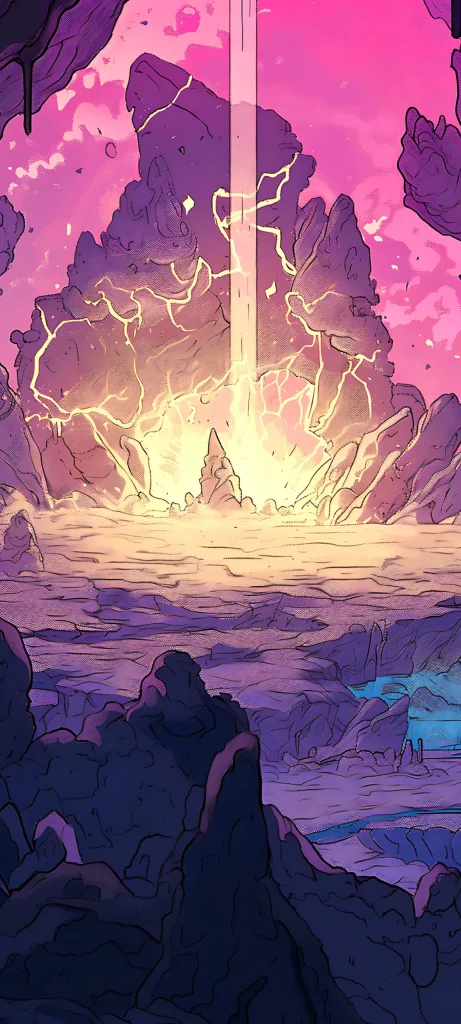Navigating the world of tabletop gaming and the overarching geek culture often feels as though we're learnign an entirely new language—not surprising for a community that loves conlangs. There are numerous acronyms, slangs, and references that can often be indecipherable for beginners; sometimes even for veterans.
In our Studio, the worlds of audio, music, games, tabletop, and everything in betwen, collides. In this comprehensive glossary, we'll help you understand the concepts and terms often related to this sub-culture.
Glossary: Geek Culture

Geek culture encompasses many different spheres of entertainment: from tabletop to video games, from fantasy books to epic movies. In this section, we'll guide you through relevant terms that you'll likely stumble upon a lot in these types of content (and beyond).
Acronyms
5E: 5th Edition. It refers to the fitfh installment of the Dungeons & Dragons (D&D) core rulebooks released in 2014.
5.5E: Dungeons & Dragons latest rulebook installment (2024–2025); unofficial term
AAA: major company; often refers to the gaming industry in geek culture
AC: Armor Class; minimum attack roll to hit a target
AoE: area of effect; spell that hits everything in a specific radius (e.g. fireball explosion)
BBEG: Big Bad Evil Guy/Gal; main villain of a campaign
C&C: critiques and comments; alternatively, the video game "Command & Conquer"
CON: Constitution; measure of health, physical resistance, etc.
CoS: Curse of Strahd; Dungeons & Dragons official adventure module
CHA: Charisma; measure of deception, intimidation, persuasion, performance, etc.
CR: Challenge Rating; measure of an opponent's difficulty in combat; not to be confused with DC
D&D: Dungeons & Dragons
DC: Difficulty Class; minimum roll required to succeed; not to be confused with CR
DEX: Dexterity; measure of agility, finesse, reaction time, etc.
DM: Dungeon Master; gamemaster on Dungeons & Dragons.
DMG: Dungeon Master's Guide; Dungeons & Dragons core rulebook
DND: Dungeons & Dragons
GM: gamemaster; game referee and storyteller
HP: Hit Points; Health Points; amount of damage that a character can sustain
HotDQ: Hoard of the Dragon Queen; Dungeons & Dragons official adventure module
INT: Intelligence; measure of cognition capacity, knowledge recollection, pattern recognition, etc.
LARP: live-action role-playing; acting and dressing as a fictional character
LFG: looking for group; to seek a gaming group
LMoP: Lost Mine of Phandelver; Dungeons & Dragons official adventure module
MM: Monster Manual; Dungeons & Dragons core rulebook
MTG: Magic: The Gathering, a popular tabletop card game
NPC: non-player character; character controlled by the gamemaster or the computer
NSR: New School Revolution; as opposed to OSR
OC: original content; original character
OP: over-powered; excessively strong
OSR: Old School Renaissance; a tabletop role-playing movement interested in game design and playstyle principles inspired in the earliest days of TTRPG in the 1970s.
PC: player character; as opposed to NPC
PHB: Player's Handbook; Dungeons & Dragons core rulebook
PnP: pen and paper; an older term for a tabletop role-playing game
QoL: quality of life; improvements in accessibility, practicality, and simplicity
RPG: role-playing game; a game in which the player interprets a specific character
RNG: random number generator; a tool that output sa pseudo-random number (e.g. virtual dice)
STR: Strength; measure of physical prowess
TPK: total party kill; the death of every player character
TTRPG: tabletop role-playing game
VTT: virtual tabletop; an online tool with digital battle-maps, miniatures, etc
WIS: Wisdom; measure of will power, psychological resistance, etc.
WoTC: Wizard of the Coast; parent company of Dungeons & Dragons and Magic: The Gathering
Dice
d2: "two-sided die," often a simple coin toss; uncommon term
d4: four-sided die (tetrahedron)
d6: six-sided die (cube); the most common die in the world
d8: eight-sided die (octahedron)
d10: ten-sided die (decahedron)
d12: twelve-sided die (dodecahedron)
d20: twenty-sided die (icosahedron); the most popular die in tabletop role-playing games
d100: "hundred-sided die," almost a sphere; may refer to 2d10
Dungeons & Dragons
cantrip: magical effect that can be repeated indefinitely
death saving throw: attempt to resist death after reaching 0 Hit Points
feat: special skill due to background, class, or another source
hit die: amount of Hit Points that a character can recover per rest or gain per level up
passive perception: ability to stay alert or notice details without attentive focus
saving throw: sum of rolls and modifiers to determine a potentially bad outcome (i.e. dodging a trap).
spell slot: amount of spells that a character can cast according to the spell's level
Jargon
ability check: sum of rolled dice and modifiers to determine the success of an intended action
ability score: basic character capability (e.g. Intelligence, Strength)
actual play: professional gaming group with high-quality production (e.g. voice actors)
advantage: rolling two dice and picking the highest number; as opposed to disadvantage
adventure module: official book that outlines a pre-made campaign with characters, quests, etc.
attack of opportunity: an attack outside of one's turn due to a specific trigger (e.g. running close to an enemy)
Big Bad: main villain of a campaign
buff: to make it stronger
build: a specific playstyle based on class, feats, etc. (e.g. Oathbreaker Paladin, Necromancer Wizard)
campaign: complete playthrough and storyline; a series of sessions
character sheet: pages that detail a character's attributes, backstory, inventory, etc.
class: character archetype that defines in-game capabilities (e.g. Barbarian, Sorcerer)
critical roll: rolling a 20 (critical success) or a 1 (critical fail) on a d20; not to be confused with Critical Role
crowd control: abilities that hinder a group, such as slowing, stunning, or immobilizing
conlang: constructed language; fictional dialect often used in media (e.g. Dothraki, Klingon).
die: singular of dice
disadvantage: rolling two dice and picking the lowest number; as opposed to advantage
face of the party: a character who handles social interactions for a group; primary spokesperson
fireball: the only spell that a Wizard can cast
flip mat: a battle map with two usable sides and can be "flipped"
fudging: to lie about a dice roll
gamemaster: referee and storyteller of a game
glass cannon: a character with high damage but low defense
grimoire: book that lists magical spells; spellbook
guild: organized group with shared identity, objectives, and values
healer: a character that restores health and removes negative status effects from allies
healbot: a character that exclusively heals despite having other abilities; slightly negative term
homebrew: original campaign or rule created by a particular gaming group
house rule: rule adopted or create by a particular gaming group; as opposed to an official rule
hybrid: campaign that is played sometimes online and other times in person
indie: independent; game created by a relatively small company; as opposed to AAA
initiative: value that determines turn order
inventory: list of items owned by a character
level up: to increase a character's level (measure of attributes, skill, spells, etc.)
loot: to grab items from defeated enemies or treasure chests (e.g. "He looted the goblin."); the items themselves (e.g. "There's loot everywhere.")
mana: magic reserve
Mercer effect: unrealistic expectations based on the professional campaigns run by Matt Mercer
metagaming: playing disregarding roleplay as if characters are omniscient
mini: short for miniature; figurines that aid combat visualization; action figures
min-maxing: minimizing weaknesses and maximizing strengths; extreme character optimization
modifier: value added to or subtracted from a dice roll
natural 1: rolling 1 on a d20; "natural" because modifiers are disregarded
natural 20: rolling 20 on a d20; "natural" because modifiers are disregarded
nerf: to make it weaker
party: the player group
percentage dice: rolling 2d10, 1st indicates tens and 2nd indicates units (e.g. 8 and 5 = 85%)
professional DM/GM: a person paid to be a Dungeon Master or gamemaster
quest: goal; mission; objective
quest-giver: character that gives quests
race: older term for species
railroading: forcing the story through a rigid, inflexible path; disallowing player agency
roll: the result of rolling a die
rule of cool: changing a game rule to allow a fun moment
solo-play: playing a tabletop role-playing game by oneself; as opposed to a gaming group
session: a single gaming event that often lasts a few hours; part of a greater campaign
spell: magical effect
spellbook: book that lists different spells; grimoire
spellcasting: the act creating a magical effect
table: gaming group
tabletop: abbreviation of tabletop role-playing game
tank: a character with high defense that can sustain damage and draw enemy attention
theater of the mind: to imaginethe scenario instead of using visual aids (e.g. maps, minis, etc.)
worldbuilding: to create a fictional setting, may encompass biology, geography, politics, religion, etc.
X card: a card that players can show during a session if they want to skip an uncomfortable scene
MGS Glossary
We're often talking with our community through platforms such as Discord, Patreon, and YouTube, which means that some inside jokes or terms were created along the way. Here are some of them!
Astarrys: name of our official mascot; a magical raven from Michaël's worldbuilding.
bard: endearing term for our composers
Discord: popular instant messaging app and the most used communication tool in our team; an alternative to any questions you might send through email or social media.
meadow: an inside-joke on the MGS community because an ambience titled "Meadow" was never chosen after appearing in multiple polls
Opus: an online platform to manage audio, descriptions, and scenes in tabletop role-playing games
MGS: Michael Ghelfi Studios; largest audio label for tabletop role-playing games
The Eyrie: official name of the Discord server of Michael Ghelfi Studios
Audio Glossary

Audio is our craft, and if you wish to understand it thoroughly, consider the following terms:
Adventure Theme: an exclusive 20-minute music track released monthly to patrons
ambiance: a looping ambient track that depicts an environment (e.g. rainy forest)
ambience: an alternative spelling of ambiance
Bandcamp: an online platform to download albums
curated playlist: carefully selected playlist; as opposed to automatic or random playlists
Patreon: a subscription platform to get access to exclusive audio
patron: a subscriber to a Patreon page
SFX: sound effects; often short, immediate sounds
Short Theme: a short song that depicts a class (e.g. Barbarian) or theme (e.g. Gothic).
Spotify: online platform to stream music, podcasts, etc.
VST: Virtual Instrument Libraries
Music Glossary

minor key: tonal framework of a musical piece centered around a minor chord, primarily using notes from minor scales
minor scale: specific sequence of intervals (whole and half steps) that creates the characteristic minor sound (e.g. examples include natural, harmonic, and melodic)
vibrato: musical technique involving rapid, slight variations in pitch that creates a wavering effect
vocoder: electronic device that analyzes the spectral characteristics of one audio signal (e.g. speech) and applies them to another signal (e.g. a synthesizer), creating a robotic vocal effect
Tech Glossary

API: Application Program Interface; a way for different apps to communicate with each other
download: acquiring audio files to play them in a device (e.g. computer, phone); requires storage space and manual organization; as opposed to streaming
Ogg: a high-quality audio file format; files ending in the extension ".ogg"
PDF: Portable Document File; a widely popular file format for multi-media documents, including text, formatting, images, and more; files ending in the extension ".pdf"
streaming: playing audio files directly in an app (e.g. Spotify, YouTube) or browser (e.g. Chrome, Firefox); requires an active internet connection; as opposed to download
Glossary: Other
cannon fodder: derogatory military term for "disposable" combatants (e.g. frontline infantrymen)
headcanon: a person's theory about the story of a work of fiction ("canon")


![A close up photograph of a gold-lined medieval helm. Illustrates [alt text].](https://www.michaelghelfistudios.com/wp-content/uploads/2025/01/HEADERKnightEyeslit.unsplash.carlos-felipe-ramirez-mesa-X9nrbX_Scn4.webp)
